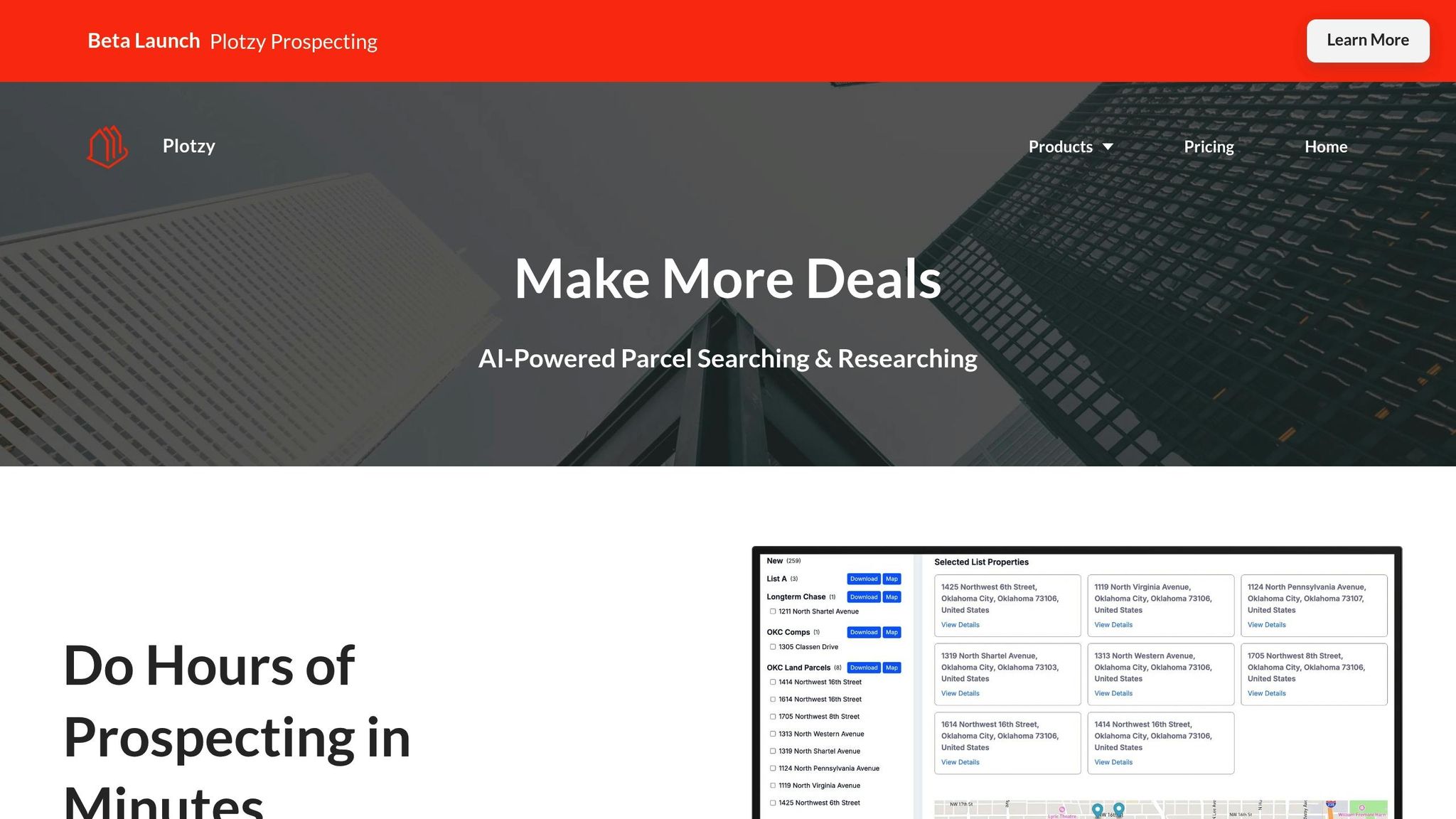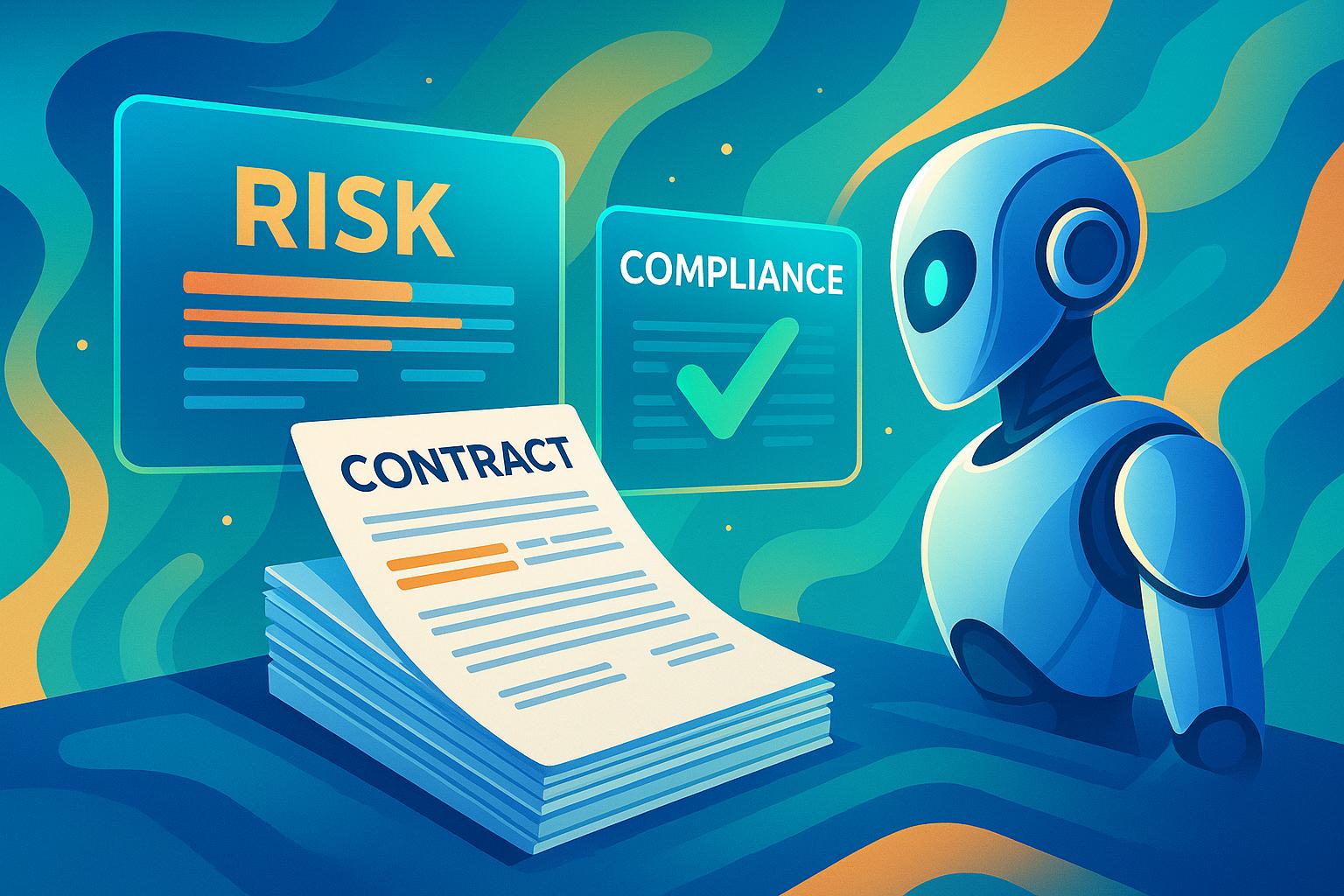The commercial real estate (CRE) industry is transforming how professionals work, thanks to AI-powered tools. These "co-pilots" automate time-consuming tasks like property research, zoning analysis, and data management. They provide faster access to data, improve decision-making, and free up time for strategic priorities.
Key takeaways:
- Faster workflows: AI reduces research and administrative tasks from days to minutes.
- Improved decision-making: Tools offer data-backed insights for property valuation, site selection, and investment analysis.
- Enhanced efficiency: AI simplifies zoning analysis, municipal data access, and owner identification.
- Competitive edge: Speed and precision in decision-making help secure deals in a fast-paced market.
Platforms like Plotzy integrate these capabilities into a single interface, offering plans starting at $65/month. AI is no longer optional in CRE - it's becoming essential for staying ahead in the industry.
Is CRE ready for AI? | The Tony Stark Suite for Real Estate Agents | The Concrete Voice
What AI-Powered CRE Tools Can Do
AI-powered tools in commercial real estate (CRE) are transforming the industry by automating tasks and delivering instant insights. These tools process massive amounts of data in seconds, offering scenarios and recommendations that would typically take hours - or even days - of manual effort. By providing detailed insights, they enhance decision-making in areas like property research, zoning, municipal data access, and prospecting, making the entire process more efficient.
Property Research: Faster and Smarter
Property research has always been a time-intensive part of CRE. AI tools simplify this by pulling and organizing data from sources like county tax assessors, municipal records, and public databases. This streamlines due diligence and speeds up site selection.
Take Colliers, for example. AI has drastically reduced the time needed for lease administration tasks. What once took five to seven days now takes mere minutes. After a client cyberattack in 2024, the firm used AI-powered optical character recognition to analyze screenshots of rent rolls and lease documents. Chris Zlocki, Head of Client Experience and Executive Vice President, Occupier Solutions at Colliers, shared:
"What used to take a lease administration team five to seven days now takes minutes."
In this case, AI extracted payment details and due dates from 40–50 screenshots - a task that would have required a week of work by two to three people using traditional methods. Beyond this, AI-powered underwriting processes have accelerated transactions and improved property and market analysis, fueling investments on a global scale.
Simplifying Zoning Analysis
Zoning has long been a tricky area for CRE professionals, with dense regulations and complex municipal codes. AI tools take the headache out of zoning analysis by automating the process and offering instant design and development options for specific sites. These tools can interpret zoning codes, streamline compliance checks, and provide real-time insights for planners and legal teams.
Generative AI takes this a step further, interpreting zoning tables and creating algorithms to calculate site capacities. In cities like Oakland, California, and Auckland, New Zealand, experiments with Generative AI have shown it can evaluate zoning constraints and automatically compute capacity. This technology also speeds up variance approvals and ensures consistent rule application, making the permitting process more predictable. With clearer zoning data, CRE professionals can make faster, more informed decisions.
Streamlined Access to Municipal Data
Gathering municipal data has traditionally been a slow, fragmented process. AI tools now centralize access to key information such as development fees, building permit requirements, and government contacts, cutting down on delays and inefficiencies. Organizations leveraging AI in property management have seen operational efficiency improve by 20–30%.
These tools also automate initial site assessments, compliance checks, and impact studies, reducing the time needed for rezoning or development approvals. By integrating municipal data access with prospecting capabilities, AI provides a comprehensive toolkit for CRE professionals.
Smarter Prospecting and Owner Identification
Finding property owners and off-market opportunities once meant hours of manual research through public records. AI tools now handle this automatically, generating exportable prospect lists and cross-referencing multiple data sources to provide accurate, up-to-date ownership details.
Advanced analytics also help identify underutilized assets, boosting annualized returns by 15–20% over three years. These tools can spot patterns in property ownership, flag distressed assets, and highlight properties suited for specific developments. By automating prospect identification, AI allows CRE professionals to focus on the most promising opportunities, reinforcing efficient and informed decision-making in the industry.
Benefits for Different CRE Professionals
AI's impact on commercial real estate (CRE) is undeniable, offering tailored solutions for various roles. Each professional in the industry faces unique challenges, and AI steps in to streamline workflows, improve efficiency, and deliver better outcomes.
For Brokers
Speed and responsiveness are essential for brokers. AI tools provide instant access to detailed property data, owner contacts, and market insights, empowering brokers to deliver fast, informed service. For example, when a client has specific needs, brokers can quickly generate in-depth property reports and identify suitable opportunities. This level of responsiveness builds client trust and loyalty.
Take JLL, for instance. Their AI-powered lease contract analysis system processes agreements 30% faster than traditional methods. This allows property managers to shift focus from tedious administrative tasks to more strategic, high-value activities. The same efficiency applies to brokers making quick yet informed investment decisions.
For Developers and Investors
Developers and investors often face high-stakes decisions that require analyzing vast amounts of data. AI simplifies this process by processing market trends, demographic shifts, and regulatory information, enabling smarter and faster strategic moves. AI-powered market analysis has shown to increase returns by 23%, and professionals using these tools can identify investment opportunities 2.7 times faster than those relying on traditional methods.
AI also helps developers select the best construction sites by evaluating factors like migration patterns, market conditions, and zoning laws. Tools like Doxel, which uses AI-driven robots and drones, track construction progress in real time, cutting project delays by an average of 38%. Meanwhile, AI valuation models outperform traditional appraisals, with a median error rate of less than 4.5% compared to the typical 5–8%. Investors using these tools have even managed to negotiate purchase prices 3.7% lower than market norms for comparable properties.
By shifting from reactive to proactive strategies, AI allows developers and investors to anticipate market changes, uncover new opportunities, and stay ahead of competitors. It acts as a trusted co-pilot, reducing risks and speeding up execution.
For Land Acquisition Teams
Land acquisition teams often deal with the complexity of managing multiple parcels and navigating zoning regulations. AI simplifies this process by filtering parcels based on zoning, permitted uses, and development potential, significantly reducing the time spent on manual research. Teams can quickly access owner contact details, create exportable prospect lists, and evaluate parcels that meet their criteria.
AI also enhances compliance management. Automated zoning analysis and instant access to municipal data help teams assess feasibility faster, avoiding unsuitable properties. This is especially important in competitive markets where speed is critical to securing prime development sites.
For example, WeWork leverages AI to monitor space utilization in their coworking facilities. By analyzing sensor data and member behavior, they optimize workspace layouts, improving member satisfaction. Similarly, centralizing data on prospects and compliance helps land acquisition teams work more efficiently. It's worth noting that 60% of real estate investors are already using AI-based analytics to guide their investment strategies.
Across all roles, AI integrates data with strategic insights, acting as a powerful co-pilot in the CRE industry. It not only enhances decision-making but also provides a competitive edge in an ever-evolving market.
sbb-itb-11d231f
How Plotzy Changes CRE Workflows

Commercial real estate (CRE) workflows often involve juggling multiple websites, databases, and even trips to municipal offices just to gather basic property data. Plotzy simplifies this process by bringing everything into one unified platform. Acting as a digital co-pilot, it guides CRE professionals through the entire research and decision-making process.
All Data in One Place
In the fast-paced world of CRE, time is everything. Plotzy centralizes all the essential data professionals need in one place. By consolidating property information from various sources, it offers a complete view of the real estate market. Instead of wasting hours navigating county websites, tax assessor databases, or municipal portals, users can access all this information through a single, streamlined interface.
The platform provides detailed insights, including owner contact details, zoning regulations, and local government resources. It also helps standardize inconsistent county records, making it easier to compare properties across different regions.
Features like saving properties, managing chase lists, and bulk-searching for owner contacts eliminate the need to switch between spreadsheets, CRMs, and research tools. This all-in-one approach means less time spent on data collection and more time closing deals.
AI-Powered Features
Plotzy takes efficiency a step further with its AI-powered tools. Using Retrieval-Augmented Generation (RAG) and advanced AI, the platform delivers zoning insights instantly, skipping the need to sift through dense municipal codes.
"Plotzy is revolutionizing property research for brokers, developers, and land teams. With advanced AI tools, it streamlines parcel searching and information gathering, providing fast and accurate data from public records and county tax assessors." – Appvizer
Its AI-driven search capabilities allow users to filter parcels based on zoning and other criteria. For instance, if a developer needs industrial-zoned properties over 5 acres, Plotzy can identify these in seconds. It even integrates owner contact information directly, saving valuable time.
One standout feature is its ability to drastically cut down on owner contact research time. What used to take 20 to 30 minutes can now be done in just 1 to 2 minutes. This means professionals can spend less time hunting for data and more time negotiating and closing deals.
Plans and Pricing
Plotzy offers two subscription tiers tailored to different needs:
| Plan | Price | Best For | Features |
|---|---|---|---|
| Basic | $65/month | Brokers and individuals | Property data searches, owner contact information, list management |
| Pro | $200/month | Brokers, developers, and land teams | Unlimited property searches, instant zoning answers, parcel search by permitted use, parcel filtering with zoning layers |
The Basic plan, priced at $65 per month, is an excellent choice for individual brokers. It includes essential tools like property data searches and owner contact information, making it ideal for deal sourcing and serving clients efficiently.
The Pro plan, at $200 per month, caters to larger teams and more complex workflows. It offers unlimited property and owner contact searches, instant zoning answers, and advanced parcel filtering options. These features are perfect for professionals who need deeper insights and more robust research capabilities.
Both plans are designed to save time and boost productivity. By cutting manual research time by up to 80%, even the Basic plan quickly justifies its cost. With a perfect 5.0/5 rating from 8 users, Plotzy has already earned high marks for its effectiveness.
Whether you're an individual broker or part of a larger team, Plotzy's scalable features make it a valuable tool for improving efficiency and achieving better results in CRE workflows.
Speed and Better Decisions in CRE
In the world of commercial real estate (CRE), speed and precision are the keys to closing multi-million-dollar deals. By leveraging unified data and AI-powered research, professionals can significantly accelerate their decision-making without compromising quality. These advancements not only streamline processes but also strengthen the decision-making framework across CRE operations.
Measuring Time Savings
The numbers paint a clear picture of how AI is reshaping CRE workflows. Today, 76% of CRE organizations use smart automation to tackle their most significant challenges. Tasks that once took weeks can now be completed in mere minutes with AI assistance. From lease abstraction to underwriting, AI dramatically reduces time spent on processes, giving companies a competitive edge by speeding up market entry and decision cycles.
Take underwriting as an example - AI can shrink the process from days to under a minute for standard deals. This isn't just about saving time; it's about gaining a competitive advantage. Properties marketed with AI tools hit the market 73% faster and achieve 25% higher closing prices compared to traditional methods. In lending, AI speeds up decisions by as much as 90% compared to conventional approaches. CRE professionals who effectively integrate AI tools report average returns of 3.5 times their investment.
Better Decision Making
Speed is only part of the equation - precision matters just as much. Acting as a "co-pilot", AI doesn’t just automate tasks; it provides deeper insights that lead to smarter strategies. For instance, AI tools enhance market trend analysis and property performance evaluations, keeping pace with the fast-moving CRE environment. AI can also improve lead qualification accuracy by 40%, allowing professionals to focus on the most promising opportunities. By automating data analysis, these tools uncover hidden patterns in vast datasets, helping identify lucrative property investments and predict future performance.
AI’s impact extends to operational efficiency, too. Predictive maintenance, for example, can cut downtime by up to 60%. Nome Capital Partners demonstrated this with JLL's Hank platform, using it to reduce HVAC energy consumption by 45%, decrease deviations from tenant setpoints by 60%, and double the circulation of fresh air in a highly leased building. While AI enhances decision-making, it works alongside human expertise rather than replacing it.
Old Methods vs. AI-Driven Workflows
When comparing traditional methods to AI-driven workflows, the advantages of AI become strikingly clear:
| Process | Traditional Method | AI-Driven Method | Time Difference |
|---|---|---|---|
| Property Valuation | Manual research and market comparisons | Real-time estimates delivered in seconds | Weeks to seconds |
| Market Research | Extensive data gathering from multiple sources | Instant analysis of comprehensive datasets | Hours to minutes |
| Lead Qualification | Manual review with varying accuracy | Automated processing with 40% improved accuracy | More precise |
| Maintenance Planning | Reactive repairs and scheduled checks | Predictive maintenance reducing downtime by 60% | Proactive efficiency |
For example, traditional property valuation relied heavily on manual research and market comparisons. In contrast, AI-powered valuation models process vast datasets in seconds, offering a more objective and structured approach. Similarly, AI has revolutionized market research by simplifying data retrieval and analysis. With 83% of companies now prioritizing AI as a core business strategy, those sticking to outdated workflows risk falling behind.
The evidence is undeniable: AI doesn’t just make CRE workflows faster - it makes them smarter, opening doors to opportunities that were previously out of reach with traditional methods.
Using AI as Your CRE Co-Pilot
In today’s commercial real estate (CRE) landscape, AI isn’t just an add-on - it’s becoming a core part of how the industry operates. As Spencer Burton puts it:
"Artificial intelligence… is rapidly becoming an integral part of how work gets done in commercial real estate"
Whether your focus is acquisitions, development, management, investor relations, or brokerage, the real question isn’t if you should adopt AI, but how effectively you can make it a part of your daily workflow.
The key lies in fully integrating AI into your routine to simplify tasks, automate repetitive work, and uncover insights that might otherwise go unnoticed. This means going beyond occasional use and embedding AI into your decision-making process. When done right, AI becomes a natural extension of your operations.
Start by addressing immediate needs. Use AI tools to automate time-consuming tasks like property searches, ROI calculations, or market research. This frees up time for more strategic priorities, like building relationships and long-term planning. Once you see the benefits of these initial steps, scaling AI to handle more complex tasks becomes a logical next move.
Choose tools that are intuitive and easy to use. The best AI solutions don’t add complexity - they simplify your workflow. For example, Plotzy offers features like AI-powered parcel searches, instant zoning information, and quick access to owner contact details, all through a user-friendly interface. These tools reduce the learning curve and fit seamlessly into existing processes.
AI can also transform how you approach deal sourcing and negotiations. It can help identify undervalued properties, assess price flexibility, and even pinpoint high-ROI opportunities before they hit the mainstream market. This gives you a significant edge when evaluating deals.
To maximize AI’s potential, it’s crucial to continuously monitor and refine how you use these tools. Regularly assess their performance and adjust based on user feedback and shifting market conditions. This ongoing refinement ensures that your AI strategy evolves alongside your business needs.
One of AI’s most powerful benefits is its ability to unify data across teams. By providing accurate, real-time information, AI bridges communication gaps and ensures everyone is working from the same playbook. This consistency speeds up decision-making and keeps your organization aligned.
The takeaway is clear: AI doesn’t just make you faster - it makes you smarter. By embracing AI as your CRE co-pilot, you’re not just adapting to industry changes; you’re positioning yourself to lead the way forward.
FAQs
How do AI tools help professionals make better decisions in commercial real estate?
AI tools are transforming the commercial real estate world by making complicated tasks more manageable and offering insightful data. They can break down market trends, forecast property values, and take care of repetitive jobs like property research and tenant communication. This gives brokers, developers, and investors more time to concentrate on big-picture strategies rather than getting bogged down in routine tasks.
On top of that, AI boosts lead generation, sharpens pricing models, and provides a more precise way to evaluate risks. By streamlining daily workflows and delivering actionable insights, these tools help professionals make quicker, smarter decisions, leading to better results in property sourcing and evaluation.
What are the key advantages of using Plotzy for brokers and land acquisition teams?
Plotzy equips brokers and land acquisition teams with tools to simplify crucial tasks like property research, zoning analysis, and navigating municipal processes. By cutting through complexities, it streamlines workflows, saving time and enabling professionals to dedicate their energy to more impactful activities.
With data-backed insights and advanced prospecting tools, Plotzy helps users make quicker, more informed decisions. This leads to greater efficiency and improved results when identifying and assessing real estate opportunities.
How does AI help simplify zoning analysis and access to municipal data in commercial real estate?
AI has revolutionized the way zoning analysis and municipal data are handled by leveraging tools like geospatial analytics and GIS technology. These advanced systems provide precise, real-time insights, making it easier for professionals to evaluate zoning rules, spot redevelopment opportunities, and assess land use potential - all without the hassle of tedious manual research.
By automating the collection and analysis of municipal data, AI not only speeds up decision-making but also simplifies workflows. This means brokers, developers, and investors can save valuable time and concentrate on tasks that truly matter. The result? Faster property evaluations and smarter, more informed real estate strategies.


